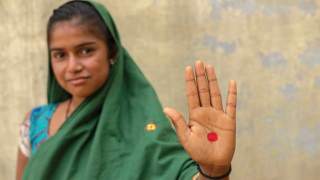Menstrual health refers to ‘a state of complete physical, mental, and social well-being and not merely the absence of disease or infirmity, in relation to the menstrual cycle’.

The emerging global indicators for menstrual health
A detailed definition of menstrual health, including access to information, facilities, and supportive environments, was agreed upon by the Global Menstrual Collective through a multi-stage process and published in 2021.
While the definition of menstrual health is multi-faceted and spans different sectors, new questions related to menstrual health indicators have been progressively included in household surveys used for national and global water, sanitation and hygiene monitoring. These indicators can be grouped into the following seven areas, including six indicators which are included in the 7th round of the UNICEF Multiple Indicator Cluster Survey (MICS7):
- Awareness of menstruation before menarche (first menstruation)
- Use of menstrual materials (not included in MICS7)
- Enough menstrual materials
- A private place to change menstrual materials at home
- No trouble participating in activities during menstruation, such as school, work and social activities
- Ability to reduce menstruation-related pain
- Comfort seeking help for menstrual problems for a health care provider
Monitoring SDG targets related to menstrual health
Menstrual health is central to achieving multiple Sustainable Development Goals (SDGs) and fulfilling basic human rights. It is directly linked to SDG target 6.2, which aims to achieve ‘access to adequate and equitable sanitation and hygiene for all… paying special attention to the needs of women and girls…’, and in recent years, water, sanitation and hygiene programmes have dedicated more attention to menstrual health needs.
The JMP expanded its database in 2021 to incorporate harmonized menstrual health indicators, including a new tab in the JMP Country Files. The JMP 2025 progress update on WASH in households included a dedicated section on menstrual health and an Annex summarising available national estimates on menstrual health for 70 countries.
Enhancing data collection
National data on these emerging indicators are typically collected through household surveys that include a women's questionnaire, with a range of questions for women and girls age 15 to 49 who have recently menstruated.
In addition to the 2.1 billion people in this group, many people start menstruating before the age of 15 and there are also transgender, intersex, and non-binary people who experience a menstrual cycle. While menstruation can be a taboo topic, the importance of menstrual health is increasingly recognized, and advances have been made both in terms of norms and monitoring.
Emerging national data on each of these indicators have been compiled and harmonized across countries and surveys, to the extent possible, to support cross-country comparison. The data available on the JMP website and progress update are based on JMP regression methods to calculate estimates from available surveys for each indicator. The JMP does not currently use a service ladder for menstrual health, as norms and standards relating to menstrual health and associated water, sanitation, and hygiene needs are still evolving.
During 2022, the JMP convened experts to seek technical recommendations on updating the JMP core questions for monitoring menstrual health in household surveys, specifically in the questionnaire for individual women. The resulting zero draft of 'Proposed questions on menstrual health for inclusion in household survey questionnaires for individual women' aimed to: provide impactful data that can support national policy and programming changes, reflect the new definition of menstrual health, include emerging recommended questions and indicator domains from MH experts, prioritize questions already being used in national surveys and data collection efforts, maintain comparability with previously used questions to support time series data, and optimize the number of questions while ensuring they are clear and simple.
In 2025, the JMP convened a workshop to review lessons from implementation of the MICS7 complementary module on Menstrual Health and Hygiene (MHH), which was launched in 2023. Participants included representatives from seven MICS7 countries (Bangladesh, Belize, Madagascar, Mongolia, Nepal, Pakistan (Punjab province and Gilgit-Baltistan region), and Tonga), the Gates Foundation, the WHO/UNICEF JMP, UNICEF, international survey programmes (UNICEF MICS, ICF DHS, WHO GAMA, World Bank LSMS), and MHH experts and researchers. The workshop highlighted six key takeaways:
- MICS7 advanced harmonized national MHH monitoring, but we can do more with the data
- MICS7 is foundational but additional data sources and research are needed
- Early experiences provide insight to improve training and data collection for MHH
- Collaboration mechanisms are needed to integrate and scale MHH monitoring across sectors
- MHH data can be more accessible and actionable
- Evidence is needed to support effective MHH advocacy and intervention.
Acknowledgments
The JMP team is grateful to the following menstrual health experts for their review of the menstrual health chapter in the 2025 household report: Marije Broekhuijsen (UNICEF), Bethany Caruso (Emory University), Julie Hennegan (University of Queensland), Thérèse Mahon (WaterAid), Penelope Phillips-Howard (Liverpool School of Tropical Medicine), Marni Sommer (Columbia University), Belen Torondel-Lopez (London School of Hygiene and Tropical Medicine).